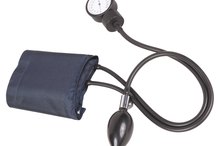A Comparison of Stethoscopes
To the casual observer, the purchase of a stethoscope may seem no different from buying a pair of practical work shoes. Any pair will do, as long as they're comfortable. But a stethoscope is so much more. Doctors and nurses rely on them constantly, so it's well worth doing some careful investigating before making a choice. And there have never been more stethoscopes to choose from.
If you are experiencing serious medical symptoms, seek emergency treatment immediately.
The Basics
Every stethoscope shares some basic features: a chest piece, earpieces and tubing. It’s the attention to detail given each of these that accounts for the wide range of quality and price.
The chest piece is made of the diaphragm (for high frequencies) and the bell (for low frequencies). Dual-head chestpieces have the diaphragm on one side and the bell on the other. Single-head chestpieces have both the diaphragm and bell on one side and depend on pressure to detect different frequencies.
The tubing is essentially the same in most stethoscopes. What's really important is the length: not because shorter tubing allows you to hear better (it doesn't), but because longer tubing enables you to avoid bending over patients, to keep sick patients at arm's length, and to drape the stethoscope around your neck without slipping off. Standard lengths are 22 inches to 28 inches.
3M Littmann
How to Assemble a Blood Pressure Cuff
Learn More
Many practitioners consider the 3M Littmann to be the Cadillac of stethoscopes. First patented in 1963, these stethoscopes feature a diaphragm that can be tuned to low or high frequencies without being turned over.
Lightweight II S.E. has a unique chest piece shaped to fit easily under blood-pressure cuffs and patient clothing. It comes in six colors and 28-inch length. $45.
Classic II S.E. has acoustics that are superior over the Lightweight, but not what you'll get in the Cardiology series. It is available in 15 colors and 28-inch length. $70.
The Cardiology III chestpiece has two tunable diaphragms: one large for adult patients and one small for thin adult and pediatric patients. It is available in nine colors and 22-inch length. $140.
Welch-Allyn
Welch-Allyn is another highly respected maker of stethoscopes. The company originated nearly 100 years ago in 1915 and is still family-owned. It prides itself on focusing on practitioners on the front line of care.
The Professional has a dual-head chest piece and custom-fitting headset. Available in six colors and 28-inch length. $85.
The Tycos Harvey Elite has a double-head chest piece that enable you to hear different frequencies without variable pressure. Features dual-bore tubing for optimal sound. Available in four colors and 25-inch and 28-inch length. $232.
Sprague Rappaport
Difference Between Cheap Vs. Expensive Golf Drivers
Learn More
Sprague Rappaport is known for selling the most popular stethoscope in the world. Spragues, as they are commonly called, were developed in 1940 and were the first instruments to combine the diaphragm and bell into one chest piece. Sprague Rappaport prides itself on offering choices that are easy to use.
The Adscope 641 features five chest piece fittings (two diaphragms and three bells for infant, pediatric and adult). It may be the huge selection of colors or it may be the price, but this model outsells all other stethoscopes worldwide. Comes in 24 colors and 22-inch length. $18.
The Omron is designed to detect the entire range of heart and lung tones. Also features five chest piece fittings. Available in three colors and 22-inch length. $28.
Recommendations
A research team from the University of Alabama tested 38 different stethoscopes using audio equipment to see if there was an appreciable difference in acoustics between cardiology, physical assessment, and basic assessment models. They found that there was no significant difference between the Littmann Classic S.E. and Cardiology series, or between the Littmanns and the Welch-Allyn Harvey Tycos Elite or Professional models.
Dr. Eli Finkelstein of Trinitas Hospital, however, tested 12 stethoscopes for acoustics and clinical utility using both human volunteers and audio laboratory equipment and found clear differences. Among the stethoscopes tested, he rank-ordered the seven top models as Littmann Cardiology III, Sprague Rappaport Omron, Littmann Master Classic II, Littmann Cardiology I, Littmann Classic II S.E., Welch-Allyn Harvey Tycos Elite and Sprague Rappaport Elite. Dr. Finkelstein concluded that the Littmann Cardiology III was an easy winner, readily discerning all heart sounds without noise interference. He does cite the Sprague Rappaport Omron as best buy, saying it rivals the Littmann Cardiology III in acoustic performance at a fraction of the price.
Finding the stethoscope that's perfect for you may require some trial and error. If a colleague owns a stethoscope you're interested in, try buying a pair of eartips and asking to borrow her stethoscope on her day off. Trying out several stethoscopes for a shift each will tell you which one is right for you.
Related Articles
References
Writer Bio
Tracy Flynn is a nursing professor at Lewis-Clark State College in Lewiston, Idaho, where she has taught health care policy and economics as well as public health for 10 years. Her prior experience as a certified public accountant has provided her a unique perspective as a nurse. She is currently pursuing doctoral studies at Gonzaga University in leadership and social justice.









